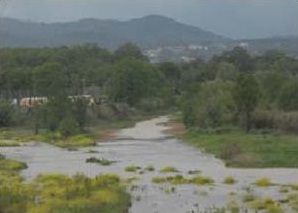Case study:Fluvial river restoration of Tordera in Tordera
Project overview
| Status | Complete |
|---|---|
| Project web site | |
| Themes | Habitat and biodiversity, Hydromorphology, Land use management - agriculture |
| Country | Spain |
| Main contact forename | ACA |
| Main contact surname | ACA |
| Main contact user ID | |
| Contact organisation | ACA |
| Contact organisation web site | |
| Partner organisations | |
| Parent multi-site project | |
| This is a parent project encompassing the following projects |
No |
Project summary
Tordera River as it passes through the town of Tordera has lost the dynamism that was a few years ago, leaving behind an oxbow on the left.
The main objectives are improve lateral and longitudinal connectivity, both hydrological and biological, improving the diversity of habitats in the river system, restore riparian plant communities and minimize flood risk .
Monitoring surveys and results
Lessons learnt
Image gallery
|
Catchment and subcatchmentSelect a catchment/subcatchment
Catchment
Subcatchment
Other case studies in this subcatchment: Fluvial river restoration of Tordera in Sant Celoni, Sustainable management, at local level, of the alluvial aquifer of the River Tordera, through the reuse of waste water
Site
Project background
Cost for project phases
Reasons for river restoration
Measures
MonitoringHydromorphological quality elements
Biological quality elements
Physico-chemical quality elements
Any other monitoring, e.g. social, economic
Monitoring documents
Additional documents and videos
Additional links and references
Supplementary InformationEdit Supplementary Information
| ||||||||||||||||||||||||||||||||||||||||||||||||||||||||||||||||||||||||||||||||||||||||||||||||||||||||||||||||||||||||||||||||||||||||||||||||||||||||||||||||||||||||||||||||||||||||||||||||||||||||









